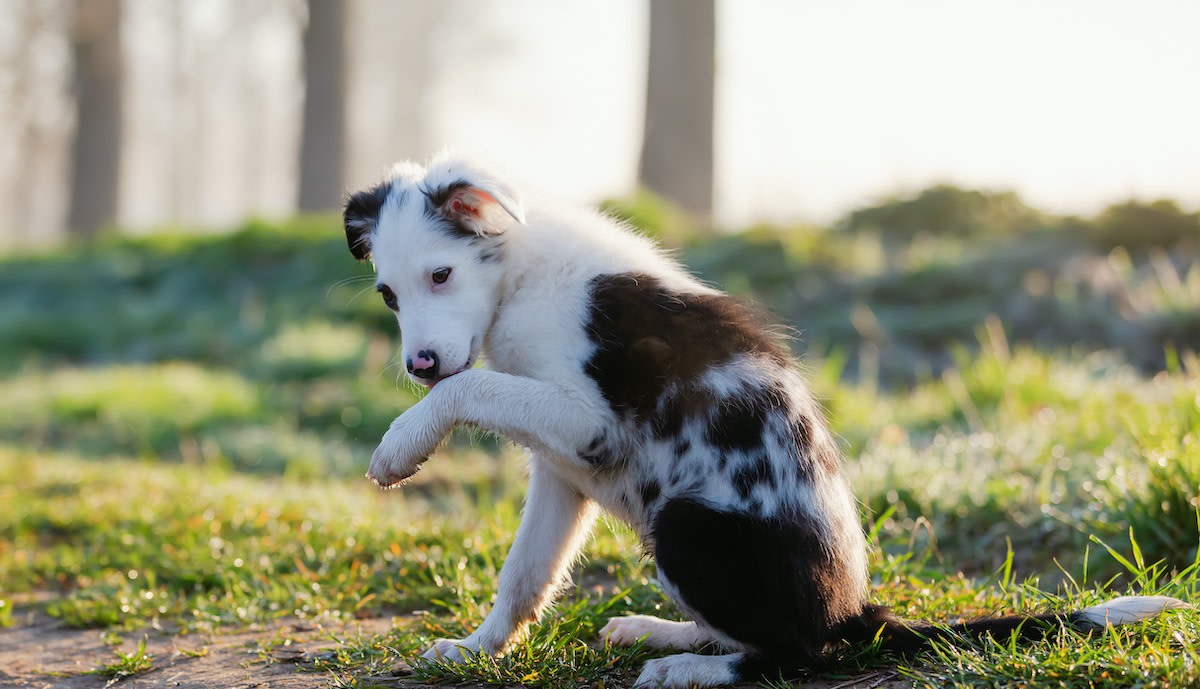How to Stop Your Dog From Licking Their Paws Excessively
Written by MasterClass
Last updated: Dec 6, 2021 • 4 min read
Dogs often lick their paws to relieve stress or pain caused by injuries or other medical conditions. Here’s how to stop your dog from licking their paws excessively.
Learn From the Best
Why Do Dogs Lick Their Paws?
Dogs generally lick their paws when they feel pain or to relieve stress. Occasional paw-licking isn’t a big deal, but constant paw-licking may indicate an underlying medical issue. Excessive paw-licking should always prompt a call to your veterinarian to determine the cause of your dog’s paw-licking. These are some of the most common causes of paw-licking behavior:
- Allergy or irritation: Like humans, dogs can have allergic reactions to substances like pollen, spores, and mites. In addition to these common allergens, dogs can experience paw irritation from chemicals—like those in the household products used to clean floors and other surfaces—to the salt or deicing chemicals found on sidewalks in the winter. A food allergy or sensitivity can also cause itchy paws. Vets often diagnose these allergies as atopic dermatitis (AD), which may cause itchy or painful paws.
- Anxiety: Paw-licking is a natural way for dogs to deal with stress, just as humans sometimes scratch or fidget when uncomfortable. Other typical dog stress responses include pacing, panting, scratching, and sniffing. While self-grooming is normal, constant licking may be a sign of compulsive behavior due to anxiety issues like separation anxiety or noise phobia. A veterinary behaviorist can diagnose anxiety issues and prescribe anxiety medication and behavior therapy.
- Arthritis pain: Dogs often instinctively lick their paws to alleviate pain. If they don’t have a wound, the pain may be due to an internal cause, like arthritis. If you have an older dog, you may want to have them examined for arthritis.
- Dry skin: Dogs can be susceptible to dry skin that causes itchy paws or itchy skin, especially in the dryer winter months. Some dogs, especially younger dogs, can develop paw pad hyperkeratosis, which causes their skin to thicken and dry. The pain from this skin condition can be severe enough to cause limping.
- Wounds and injuries: Licking may be a sign of an injured paw. Check your dog’s paws for splinters or other foreign objects, keeping in mind that the wound may be too small to see. Hot pavement or sidewalks can also burn dogs’ paws, causing pain or infection.
- Fleas and ticks: Fleas and ticks are very common among all types of dogs and can cause your dog’s paws to itch. Some dogs are hypersensitive to fleas and ticks, which can cause more pain than usual. Your veterinarian may recommend medication to prevent insect bites from fleas and ticks.
- Yeast or bacterial infection: Yeast infections are fairly common among dogs, especially in warmer climates. A yeast infection occurs when the dog’s skin overproduces yeast cells, causing the dog’s paws to itch, especially between the paw pads. If your dog has an infection, their paws may smell rotten or rancid. Your veterinarian can prescribe an antifungal treatment or skin scraping.
How to Stop Your Dog From Licking Their Paws Excessively
There are many reasons why dogs lick or chew their paws, and if the licking is excessive, a veterinarian can help you pinpoint the underlying cause.
- 1. Address underlying causes. Most causes of excessive paw-licking, from allergies to injuries to severe anxiety, require treatment from a veterinarian. If your dog licks their paws more than occasionally, it’s time to get your vet involved.
- 2. Consider a dietary change. If your veterinarian thinks your dog may be allergic to their dog food, they may recommend placing your dog on a food trial. This months-long process involves determining which food source triggers your dog’s allergies under the supervision of a vet.
- 3. Groom regularly. If your dog is allergic or sensitive to substances, they encounter out-of-doors, wipe down their paws when they return from a walk. Bathe your dog regularly with a product specifically formulated for dogs, and consider using hypoallergenic, fragrance-free products if you think your dog may have a skin irritation. Keep the fur around your dog’s paw pads trimmed to avoid picking up burrs and twigs.
- 4. Make any necessary lifestyle changes. If your dog’s paw-licking is anxiety-related, your vet may recommend a combination of medication, behavior therapy, and lifestyle changes. Meet your dog’s needs by giving them time to sniff outside in nature and exercise their brain with puzzles and games.
- 5. Protect your dog’s feet. To prevent paw irritation, you may want to give your dog protective footwear during snowy weather, to protect from salt on the ground, and on very hot days. If the pavement feels hot to the touch during warmer months, avoid walks and instead provide your dog with plenty of indoor enrichment.
- 6. Swap out cleaning products. If you think your dog may be sensitive to the products you use to clean your floors, consider swapping them out for hypoallergenic products.
Want to Learn More About Training the Goodest Boy or Girl?
Your dream of having a dog who understands words like “sit,” “stay,” “down,” and—crucially— “no” is just a MasterClass Annual Membership away. The only things you’ll need to train up a well-behaved pup are your laptop, a big bag of treats, and our exclusive instructional videos from superstar animal trainer Brandon McMillan.
